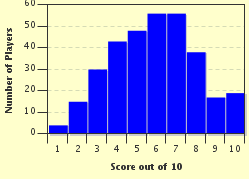Quiz Answer Key and Fun Facts
1. The "Hundred Year War" lasted 116 years. So how long did the "Six-Day War" last?
2. The Australian state of Victoria was named after Queen Victoria, the reigning monarch when statehood was established in 1851. After whom was the state of Queensland named?
3. Although it did not finish until 1815, the last armed conflict between Britain and American is popularly known as "The War of 1812". Events of which war are commemorated by the "1812 Overture"?
4. Adrian IV (c. 1100-1159) is the only English pope, and Adrian VI is the only person to become pope from which country?
5. Princess Elizabeth Land, Queen Mary Land and George V Land are all regions of the Antarctic Territory claimed by which country?
6. Which former Portuguese territory became the first new sovereign state of the 21st century on May 20, 2002?
7. Who is the longest-lived (i.e. who has lived to be the oldest) English or British monarch?
8. Which country ceased to be an independent nation when it was "re-unified" with Germany in 1938 in a process known as "Anschluss" (i.e. union/connection)?
9. When the significant Soviet composer Sergei Prokofiev died on March 5, 1953, his death went almost unnoticed because of another death on the same day. Who was the prominent leader that died on the same day as Prokofiev?
10. Conceived by four students at Harvard University. which international sporting event was first staged in Boston MA in 1900?
Source: Author
EnglishJedi
This quiz was reviewed by FunTrivia editor
bloomsby before going online.
Any errors found in FunTrivia content are routinely corrected through our feedback system.

